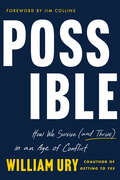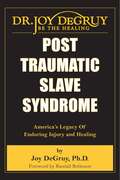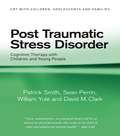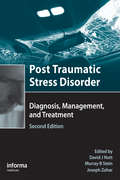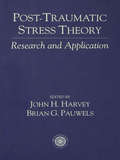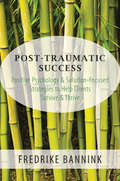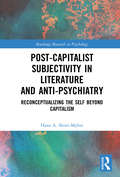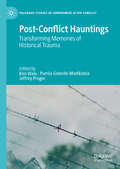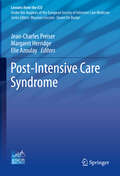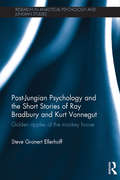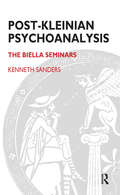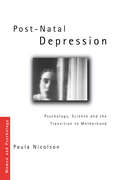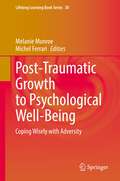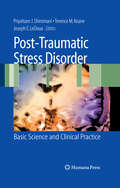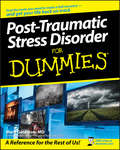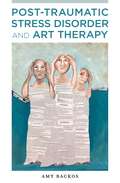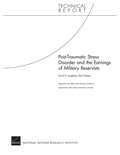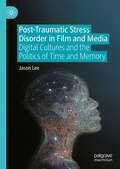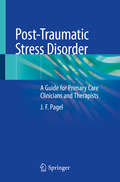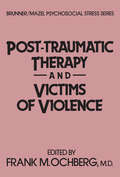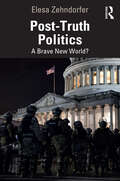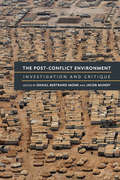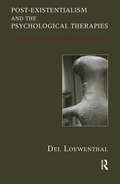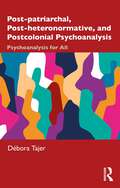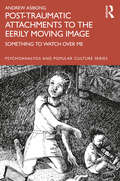- Table View
- List View
Possible: How We Survive (and Thrive) in an Age of Conflict
by William UryThe author of the world’s best-selling book on negotiation draws on his nearly fifty years of experience and knowledge grappling with the world’s toughest conflicts to offer a way out of the seemingly impossible problems of our time. Conflict is increasing everywhere, threatening everything we hold dear—from our families to our democracy, from our workplaces to our world. In nearly every area of society, we are fighting more and collaborating less, especially over crucial problems that demand solutions.With this groundbreaking book, bestselling author and international negotiator William Ury shares a new “path to possible”—time-tested practices that will help readers unlock their power to constructively engage and transform conflict. Part memoir, part manual, part manifesto, Possible offers stories and sage advice from Ury’s nearly 50 years of experience on the front lines of some of the world’s toughest conflicts.One of the world’s top experts in the field, Ury has worked on conflicts ranging from boardroom battles to labor strikes, from the US partisan divide to family feuds, from wars in the Middle East, Colombia and Ukraine to helping the US and USSR avoid nuclear disaster. Now, in Possible, he helps us tackle the seemingly intransigent problems facing us.In Possible, Ury argues conflict is natural. In fact, we need more conflict, not less—if we are to grow, change, evolve and solve our problems creatively. While we may not be able to end conflict, we can transform it—unleashing new, unexpected possibilities.Successfully tested at Harvard University with almost a thousand participants from business, government, academia, and the nonprofit sector, Ury’s “Path to Possible” proved so valuable that Harvard’s Program on Negotiation selected it as its inaugural online daylong in April 2022.Possible introduces Ury’s methods and makes them available for everyone. Combining accessible frameworks and powerful storytelling and offering dozens of examples, it is an essential guide for anyone looking to break through the toughest conflicts—in their workplace, family, community or the world.
Post Traumatic Slave Syndrome: America's Legacy of Enduring Injury and Healing
by Joy DegruyAfrican-Americans are being urged, not only by the traditional bastions of American power, but by many "successful" blacks as well, to forget slavery, to forget Jim Crow, to forget about all that Africa was prior to the advent of trans-Atlantic slavery.
Post Traumatic Stress Disorder: Cognitive Therapy with Children and Young People (CBT with Children, Adolescents and Families #40)
by Patrick Smith David M. Clark William Yule Sean PerrinPost traumatic stress disorder develops after exposure to one or more terrifying events that have caused, or threatened to cause the sufferer grave physical harm. This book discusses how trauma-focused cognitive therapy can be used to help children and adolescents who suffer from post traumatic stress disorder. Cognitive therapy is frequently used to treat adults who suffer from PTSD with proven results. Post Traumatic Stress Disorder provides the therapist with instructions on how CT models can be used with children and young people to combat the disorder. Based on research carried out by the authors, this book covers: assessment procedures and measures formulation and treatment planning trauma focused cognitive therapy methods common hurdles. The authors provide case studies and practical tips, as well as examples of self-report measures and handouts for young people and their parents which will help the practitioner to prepare for working with this difficult client group. Post Traumatic Stress Disorder is an accessible, practical, clinically relevant guide for professionals and trainees in child and adolescent mental health service teams who work with traumatized children and young people.
Post Traumatic Stress Disorder: Diagnosis, Management and Treatment
by Graeme TurnerPost Traumatic Stress Disorder can be one of the most disabling of all the anxiety disorders and is frequently misdiagnosed and ineffectively treated It is also an area in which there have been recent major advances This book sets out to solve this problem, presenting doctors with practical guidance and at the same time a state-of-the-art summary o
Post Traumatic Stress Theory: Research and Application
by John H. Harvey Brian G. PauwelsFew phenomena are as widely experienced across different individuals, cultures, and contexts as that of traumatic stress. Whether as victims, perpetrators, supporters or simply observers, most people can identify to some extent with the psychological and physical consequences produced by traumatic events. This text examines the nature of traumatic stress, the contexts in which it occurs, and the needs and coping strategies of its survivors. Topics include the survivors of rape, soldiers of war, and the nature of coping with loss or trauma in old age. Furthermore, the roles of culture, social support, and more formal organizations in the ongoing process of overcoming trauma are explored as the text details the nature of traumatic experiences, the needs of survivors, and the challenges faced by those who wish to support and help those survivors.
Post Traumatic Success: Positive Psychology & Solution-Focused Strategies to Help Clients Survive & Thrive
by Fredrike BanninkResiliency-focused approaches to managing trauma. This is a book to help clients to transform what happened to them to make them better instead of bitter. The first book on trauma to combine the theory and practice of positive psychology and solution-focused brief therapy with traditional approaches, this book veers away from a focus on pathology (what is wrong with clients and how to repair the worst) to a focus on what is right with them (and how to create the best)--that is, from post traumatic stress to post traumatic success. The three R's of post traumatic success are: Recovery, Resilience and enRichment (post traumatic growth) - concepts depicted by the bamboo plant on the book's cover. Trauma professionals will learn what it takes to help more survivors benefit more substantively from therapy and how to support their clients in developing longer-term resilience. By practicing the skills in this book, they can increase their clients' self-efficacy and self-esteem, and make psychotherapy shorter in time, more cost effective and more lighthearted for their clients and themselves. Written for all professionals and students working with trauma survivors (both adults and children) and their families and friends, it equips readers with practical direction for adopting a more positive approach and expanding their range of available techniques. Over a hundred exercises, thirty-three cases, and forty stories are presented to illustrate and help incorporate this new approach into practice. It's about time to turn the tide on treating trauma by shifting the focus from reducing distress and merely surviving to building success and positively thriving.
Post-Capitalist Subjectivity in Literature and Anti-Psychiatry: Reconceptualizing the Self Beyond Capitalism (Routledge Research in Psychology)
by Hans A. Skott-MyhreThrough the examination of anti-psychiatric theory and literary texts, this timely and thought-provoking volume explores the possibilities of liberating our habitual patterns of perception and consciousness beyond the confines of a capitalist era. In Post-Capitalist Subjectivity in Literature and Anti-Psychiatry, Skott-Myhre asks the question, how might we be different if we didn’t live in a capitalist society? By drawing on Marxist and post-Marxist theory, and conducting nuanced analysis of the professional writings of anti-psychiatrists including Basaglia and Laing, and the work of fiction writers Kafka and García Márquez, the text identifies alternative conceptualizations of the self. Focusing in particular on portrayals of institutions and the family, Skott-Myhre proposes that these social systems offer new modes of reading the world and ourselves which will transform social organization and free subjectivity from dominant capitalist structures. This transdisciplinary text responds to a revitalized interest in alternatives to traditional psychology, an interest in life beyond capitalism, and the crisis in the traditional family. Post-Capitalist Subjectivity in Literature and Anti-Psychiatry will offer timely reading for graduate students, researchers, and scholars in the fields of cultural studies, psychology, philosophy, family studies, and interdisciplinary studies.
Post-Conflict Hauntings: Transforming Memories of Historical Trauma (Palgrave Studies in Compromise after Conflict)
by Pumla Gobodo-Madikizela Jeffrey Prager Kim WaleThis book engages the globally pressing question of how to live and work with the haunting power of the past in the aftermath of mass violence. It brings together a collection of interdisciplinary contributions to reflect on the haunting of post-conflict memory from the perspective of diverse country case studies including South Africa, Rwanda, Zimbabwe, Northern Ireland, North and South Korea, Palestine and Israel, America and Australia. Contributions offer theoretical, empirical and practical insights on the nature of historical trauma and practices of collective healing and repair that include embodied, artistic and culturally relevant forms of wisdom for dealing with the past. While this question has traditionally been explored through the lens of trauma studies in relation to the post-Holocaust experience, this book provides new understandings from a variety of different historical contexts and disciplinary perspectives. Its chapters draw on, challenge and expand the trauma concept to propose more contextually relevant frameworks for transforming haunted memory in the aftermath of historical trauma.
Post-Intensive Care Syndrome (Lessons from the ICU)
by Jean-Charles Preiser Elie Azoulay Margaret HerridgeThis book, part of the European Society of Intensive Care Medicine textbook series, provides detailed up-to-date information on the physical, cognitive, and psychological impairments that are frequently present following a stay in an intensive care unit and examines in depth the available preventive and therapeutic strategies, including adapted rehabilitation programs. Beyond acquainting readers with the multiple facets of post-intensive care syndrome (PICS), the book aims to promote the effective follow-up of patients, thereby enhancing their ability to work and their functional autonomy, and to identify risk factors for the development of PICS as a stimulus to beneficial organizational changes in intensive care departments.The background to the book is the realization by healthcare providers that the quality of life of patients who have required a stay in an intensive care unit can be severely impaired or even become unacceptable. All too often, the diverse sequelae are overlooked by specialists of other disciplines. Moreover, families and caregivers are also at high risk of post-traumatic stress disorder and depression. The European Society of Intensive Care Medicine has developed the Lessons from the ICU series with the vision of providing focused and state-of-the-art overviews of central topics in Intensive Care and optimal resources for clinicians working in Intensive Care. This book, written by renowned experts in the field, will facilitate the transmission of key knowledge with significant clinical and financial benefits.
Post-Jungian Psychology and the Short Stories of Ray Bradbury and Kurt Vonnegut: Golden Apples of the Monkey House (Research in Analytical Psychology and Jungian Studies)
by Steve Gronert EllerhoffIn this book, Steve Gronert Ellerhoff explores short stories by Ray Bradbury and Kurt Vonnegut, written between 1943 and 1968, with a post-Jungian approach. Drawing upon archetypal theories of myth from Joseph Campbell, James Hillman and their forbearer C. G. Jung, Ellerhoff demonstrates how short fiction follows archetypal patterns that can illuminate our understanding of the authors, their times, and their culture. In practice, a post-Jungian ‘mythodology’ is shown to yield great insights for the literary criticism of short fiction. Chapters in this volume carefully contextualise and historicize each story, including Bradbury and Vonnegut’s earliest and most imaginatively fantastic works. The archetypal constellations shaping Vonnegut’s early works are shown to be war and fragmentation, while those in Bradbury’s are family and the wholeness of the sun. Analysis is complemented by the explored significance of illustrations that featured alongside the stories in their first publications. By uncovering the ways these popular writers redressed old myths in new tropes—and coined new narrative elements for hopes and fears born of their era—the book reveals a fresh method which can be applied to all imaginative short stories, increasing understanding and critical engagement. Post-Jungian Psychology and the Short Stories of Ray Bradbury and Kurt Vonnegut is an important text for a number of fields, from Jungian and Post-Jungian studies to short story theoriesand American studies to Bradbury and Vonnegut studies. Scholars and students of literature will come away with a renewed appreciation for an archetypal approach to criticism, while the book will also be of great interest to practising depth psychologists seeking to incorporate short stories into therapy.
Post-Kleinian Psychoanalysis: The Biella Seminars
by Kenneth SandersThe author's book combines a historical approach to the literature of Freud, Klein and the Post Kleinian development, with demonstrations of the central role of dream analysis. Students and practitioners of psychoanalysis and psychotherapy, educationalists, social scientists, doctors, and alll those who value the endeavour to enrich their work with imagination will find fine food for thought in these seminars, both in the survay of the literature, the case histories described, and in the concluding question and answer debates.
Post-Natal Depression: Psychology, Science and the Transition to Motherhood (Women and Psychology)
by Paula NicolsonPost-Natal Depression challenges the expectation that it is normal to be a 'happy mother'. It provides a radical critique of the traditional medical and social science explanations of 'post natal depression' by supplying a systematic feminist psychological analysis of women's experiences following childbirth. Paula Nicolson argues that, far from it being an abnormal, undesirable, pathological condition, it is a normal, healthy response to a series of losses.Post Natal Depression makes an important contribution to the psychology of women and feminist research and will be of interst to psychologists, social scientists, nurses and doctors.
Post-Traumatic Growth to Psychological Well-Being: Coping Wisely with Adversity (Lifelong Learning Book Series #30)
by Michel Ferrari Melanie MunroeThis book explores 'why some people experience post-traumatic growth leading to greater wisdom and others do not’ and suggests that a critical variable is how one copes with that trauma: individuals who actively reflect on their experiences of trauma should develop higher levels of self-transcendent wisdom. This same dynamic has been shown both in research studies of post-traumatic growth and by therapists working with people who have experienced trauma, but these two bodies of work have rarely been brought into direct conversation with each other. In this volume, wisdom researchers and therapists with direct experience with trauma survivors comment on each other’s ideas about how coping with adversity can lead to wisdom, and how their proposed models of developing wisdom incorporate the act of coping with a stressful or traumatic event. Based on a synthetic integration of the recommendations in each chapter, the book concludes with the introduction of a new conceptual framework that can better help even individuals who experience significant stressors in their life to cope well and develop wisdom that will be both theoretically robust and practically useful.
Post-Traumatic Stress Disorder
by Terrence Keane Joseph E. Ledoux Peter ShiromaniPost-traumatic stress disorder is a psychiatric illness that can occur in anyone who has experienced a life-threatening or violent event. The trauma can be due to war, terrorism, torture, natural disasters, violence, or rape. In PTSD the brain areas that are likely to be affected are the hippocampus (memory), amygdala (fear association), the prefrontal cortex (cognitive processing), and the ascending reticular activating system (arousal). The chemical of interest is norepinephrine, which is released during a stressful event and is part of the fight-or-flight response meant to mobilize the body to action.The objective of this title is to outline the neurobiology of post-traumatic stress disorder and provide treatment strategies for clinicians. The chapter material from this book has evolved from a seminar on PTSD held recently under the auspices of the VA Boston Healthcare System, Boston University Medical Center and Harvard Medical School. We propose a book that will focus on the epidemiology, neurobiology, MRI studies, animal models, arousal and sleep issues, clinical trials, and treatment strategies for clinicians. Treatment will cover such topics as guidelines for treating posttraumatic stress disorder, PTSD and the use of mental health services, cognitive intervention therapy, and large scale clinical trials in PTSD. This collection will be a vital source of information to clinicians and neuroscientists.
Post-Traumatic Stress Disorder For Dummies
by Mark GoulstonAs Dr. Mark Goulston tells his patients who suffer from post-traumatic stress disorder (PTSD), "The fact that you're still afraid doesn't mean you're in any danger. It just takes the will and the way for your heart and soul to accept what the logical part of your mind already knows." In Post-Traumatic Stress Disorder For Dummies, Dr. Goulston helps you find the will and shows you the way.A traumatic event can turn your world upside down, but there is a path out of PTSD. This reassuring guide presents the latest on effective treatments that help you combat fear, stop stress in its tracks, and bring joy back into your life. You'll learn how to:Identify PTSD symptoms and get a diagnosisUnderstand PTSD and the nature of traumaDevelop a PTSD treatment planChoose the ideal therapist for youDecide whether cognitive behavior therapy is right for youWeight the pros and cons of PTSD medicationsCope with flashbacks, nightmares, and disruptive thoughtsMaximize your healingManage your recovery, both during and after treatmentHelp a partner, child or other loved one triumph over PTSDKnow when you're getting betterGet your life back on trackWhether you're a trauma survivor with PTSD or the caregiver of a PTSD sufferer, Post-Traumatic Stress Disorder For Dummies, gives you the tools you need to win the battle against this disabling condition.
Post-Traumatic Stress Disorder and Art Therapy
by Amy BackosThis book focusses on art therapy as a treatment of PTSD in both theory and practice. It includes an in-depth look at what PTSD is, how it develops, and how art therapists should approach and treat it, with a focus on furthering social justice.The chapters cover a wide variety of contexts, including adults at a rape crisis centre, veterans, children in group homes and patients at substance use facilities. The second section of the book includes invaluable practical strategies and interventions based on the author's decades of experience in the field. It also discusses more complex concepts, including the impact of avoidance in maintaining symptoms of PTSD, and considers how Acceptance and Commitment Therapy can guide art therapy interventions.
Post-Traumatic Stress Disorder and the Earnings of Military Reservists
by Paul Heaton David S. LoughranAn investigation of the effects of having symptoms of post-traumatic stress disorder (PTSD) on the labor market earnings of reservists in the years following deployment.
Post-Traumatic Stress Disorder in Film and Media: Digital Cultures and the Politics of Time and Memory
by Jason LeeThis book expounds how post-traumatic stress disorder (PTSD) became so ubiquitous. The relationships between trauma, memory, and media, including the cultural, psychological, and social dimensions of PTSD are analysed. This work provides an examination of PTSD across diverse cultural contexts, shedding light on its profound impact on human experience and societal structures. This work addresses the role of social media internationally, the pornography industry, and conspiracy theories, in perpetuating trauma and shaping societal attitudes. From feature films, including Apocalypse Now, The Deer Hunter, and Jacob’s Ladder, to hit television shows such as the BBC’s Bodyguard, visual cultures have been instrumental in popularizing an understanding of PTSD. Often these are traditional “triumph over adversity” narratives. In others what is relevant is the wider postwar political landscape. Controversial wars have led to mental health problems for returning soldiers, depicted as part of a metaphoric wound for a nation. At its heart, America is concerned with the survival of the fittest, a Social Darwinist creed fused with manifest destiny and turbo capitalism. Any weaknesses, such as mental problems including PTSD, contradicted and challenged the essence of the pioneering American spirit. A book on PTSD at this moment is necessary, as the subject has become popularized and politicized, just as “madness” became a term to define an era. Through advocating for interdisciplinary approaches to foster healthier perspectives and support, here we come to a deeper understanding of how digital cultures have impacted the politics of time and memory.
Post-Traumatic Stress Disorder: A Guide for Primary Care Clinicians and Therapists
by J.F. PagelPTSD is in no way an easy diagnosis for the patient, the provider, or the therapist. It is a diagnosis developed at the border of our capacity to handle extreme stress, a marker diagnosis denoting the limits of our capacity for functioning in the stress of this modern world. For both individuals and society, PTSD marks the limits of our available compassion and our capacity to protect ourselves from the dangers of the environment and other humans. PTSD is often a chronic disease, forming at a place where mind sometimes no longer equals the brain, a point at which individual patient requirements often trump theory and belief. There are treatments for PTSD that work, and many that do not. This book presents evidence, rather than theory, anecdote, or case report. Psychological approaches including prolonged exposure, imagery rehearsal therapy and EMDR have a greater than 75% positive short-term response when used to treat PTSD. Yet these treatments vary markedly and have different, even contradictory underlying theory and objectives for treatment. Medications, rarely indicated as primary therapy, can be used to treat symptoms and address comorbid PTSD diagnoses. Treatment of sleep apnea in the PTSD population produces a positive effect on symptoms and a reduction in morbidity and mortality across the span of life. Complementary treatments offer the many individuals chronically affected by PTSD assistance in coping with symptoms and opportunities to attempt to functionally integrate their experience of trauma.
Post-Traumatic Therapy And Victims Of Violence (Psychosocial Stress Series)
by Frank M. OchbergFrank Ochberg - one of the pioneers in the field - has brought together nationally and internationally recognized experts who have treated thousands of victims in such subspecialty areas as rape, incest and battering, as well as Vietnam veterans and refugees. They provide a wealth of knowledge about Post-Traumatic Therapy (PTT) within these populations. PTT is not just a series of techniques but a clinical philosophy that requires empathic understanding of the victim, collaboration between therapist and client, and recognition of empowerment as a therapeutic tool. PTT centers on stress and coping, focuses on the strengths of the victim, and is integrative with respect to biological, psychological and social fears.
Post-Truth Politics: A Brave New World?
by Elesa ZehndorferIn recent years, rapid innovations in generative AI and social media technologies have enabled fake news to explode across our social media accounts and TV screens.Post-truth political content now routinely manipulates our realities, microtargeting us, exploiting our desires and turning our fears against us. It is an age where politics runs on emotion, not cognition, and where the democratization of disinformation has spawned a whole new global industry of disinformation entrepreneurs. It has amplified polarization, using hate, anger and fear as its oxygen.Fake news continues to bolster levels of right-wing populism not seen since the 1930s. If left unchallenged, it will continue to place its jackboot ever harder against the upturned face of democracy.Post-Truth Politics: A Brave New World? empowers voters to fight back. It provides, for the first time, a complete view of the global disinformation ecosystem: who is targeting us, how we are microtargeted, and which evolutionary, technological, marketing, neurological and military approaches are being used to manipulate us.This non-partisan book will resonate with all supporters of democracy (conservative, liberal, centrist), alongside academics in fields as diverse as media studies, sociology, politics, marketing, military studies and creative writing.
Post-conflict Environment: Investigation And Critique
by Daniel Bertrand MonkIn case studies focusing on contemporary crises spanning Africa, the Middle East, and Eastern Europe, the scholars in this volume examine the dominant prescriptive practices of late neoliberal post-conflict interventions--such as statebuilding, peacebuilding, transitional justice, refugee management, reconstruction, and redevelopment--and contend that the post-conflict environment is in fact created and sustained by this international technocratic paradigm of peacebuilding. Key international stakeholders--from activists to politicians, humanitarian agencies to financial institutions--characterize disparate sites as "weak," "fragile," or "failed" states and, as a result, prescribe peacebuilding techniques that paradoxically disable effective management of post-conflict spaces while perpetuating neoliberal political and economic conditions. Treating all efforts to represent post-conflict environments as problematic, the goal becomes understanding the underlying connection between post-conflict conditions and the actions and interventions of peacebuilding technocracies.
Post-existentialism and the Psychological Therapies: Towards a Therapy without Foundations
by Del LoewenthalA valuable contribution to the field by a professor of psychotherapy and author and editor of many titles in this area.
Post-patriarchal, Post-heteronormative, and Postcolonial Psychoanalysis: Psychoanalysis for All
by Débora TajerPost-patriarchal, Post-heteronormative, and Postcolonial Psychoanalysis considers contemporary efforts to create a post-patriarchal, post-heteronormative, and postcolonial psychoanalytic approach to human suffering.Débora Tajer examines contemporary psychoanalysis and its future by integrating three key strands of Argentinean cultural discourse: the popularity of psychoanalysis, the active feminist movement, and the burgeoning field of feminist psychoanalysis. Tajer delves into themes of subjectivity, power, gender, and family, revealing the patriarchal, heteronormative, and colonial underpinnings of classical psychoanalytical approaches. She also explores the contributions of theoretical-clinical instruments from a gender and psychoanalytical perspective. Throughout the book, Tajer highlights changes in femininities and masculinities, new family and relationship configurations, current forms of labour insertion, evolving ideals, and new modes of gender identity assumption and sexual expression.Post-patriarchal, Post-heteronormative, and Postcolonial Psychoanalysis will be of great interest to psychoanalysts in practice and in training. It will also appeal to readers looking to understand Argentinian perspectives on the future of psychoanalysis.
Post-traumatic Attachments to the Eerily Moving Image: Something to Watch Over Me
by Andrew AsibongThis book explores how traumatic experiences of impingement and neglect – in childhood and adulthood, and at both the family and the state level – may create a desire in us to be parented by certain kinds of screen media that we unconsciously believe are “watching over” us when nothing else seems to be. Andrew Asibong explores how viewers make psychical use of eerily moving images, observed in film and television and later taken into an already traumatised mind, in order to facilitate some form of reparation for a stolen experience of caregiving. It explores the possibility of a media-based “working through” of both the general traumas of early environmental failure and the particular traumas of viewers racialised as Black, eventually asking how politicised film groups in the age of Black Lives Matter might heal from a troubled past and prepare for an uncertain future through the spontaneous discussion – in the here and now – of enlivening images of potentially deadly vulnerability. Post-traumatic Attachments to the Eerily Moving Image: Something to Watch Over Me will be of great interest to academics and students of film, media and television studies, trauma studies and psychoanalysis, culture, race and ethnicity.
